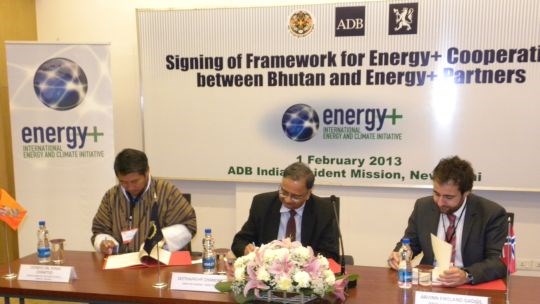Signing of Energy+ Cooperation between Bhutan, Norway and the Asian Development Bank
Historical archive
Published under: Stoltenberg's 2nd Government
Publisher: Ministry of the Environment
News story | Date: 04/02/2013
In the margins of Dehli Sustainable Development Summit 2013 State Secretary Arvinn Gadgil, Ministry of International Development signed a «Framework for Energy+ Cooperation with Bhutan» with the Royal Government of Bhutan, the Government of Norway and the Asian Development Bank. The overall objective of the cooperation is to suppport the efforts of the Royal Government of Bhutan to increase access to sustainable energy services and reduce greenhouse gas emissions through enhanced promotion of renewable energy and energy efficiency.
In the margins of Dehli Sustainable Development Summit 2013 State Secretary Arvinn Gadgil, Ministry of International Development signed a «Framework for Energy+ Cooperation with Bhutan» with the Royal Government of Bhutan, the Government of Norway and the Asian Development Bank. The overall objective of the cooperation is to suppport the efforts of the Royal Government of Bhutan to increase access to sustainable energy services and reduce greenhouse gas emissions through enhanced promotion of renewable energy and energy efficiency.
The Framework for Energy+ Cooperation with Bhutan is following-up the common intension from the Norwegian Minister of International Development Heikki Holmås and the Prime Minister of Bhutan Lyonchen Jigme Y Thinley expressed through a press release during Holmås`visit to Bhutan in October. Norway has announced the intension of supporting the Royal Government of Bhutan with NOK 100 million the next five years.
Background
Bhutan was one of the first countries to join the Energy+ partnership, and the Royal Government has several times asked to develop a cooperation based on the Energy+ design principles sectoral approach, payment by results and enabling an environment to leverage commercial investments.
The goal of Bhutan is to achieve 100% access to electricity by the end of 2013. So far more than 80% have access to electricity. 99% of the electricity consumption arise from hydro power. There are high potential of more hydro power generation in Bhutan, as well as energy efficiency options. To improve energy security Bhutan is planning to develop other renewable energy sources like solar energy, wind power and biogas.
The Energy+ cooperation with Bhutan will initially focus on increased access to energy services as electricity, heating, energy efficiency, more efficient cook-stoves in rural areas, improved legislation, and development of energy and climate plan for the energy sector. These activities will support the contribution of Bhutan to the UN initiative «Sustainable Energy for All» (SE4All). The Energy+ cooperation will also contribute to the five-yearly «Development Plan» of Bhutan and implementation of “National Strategy and Action Plan for Low Carbon Development, 2012”.
